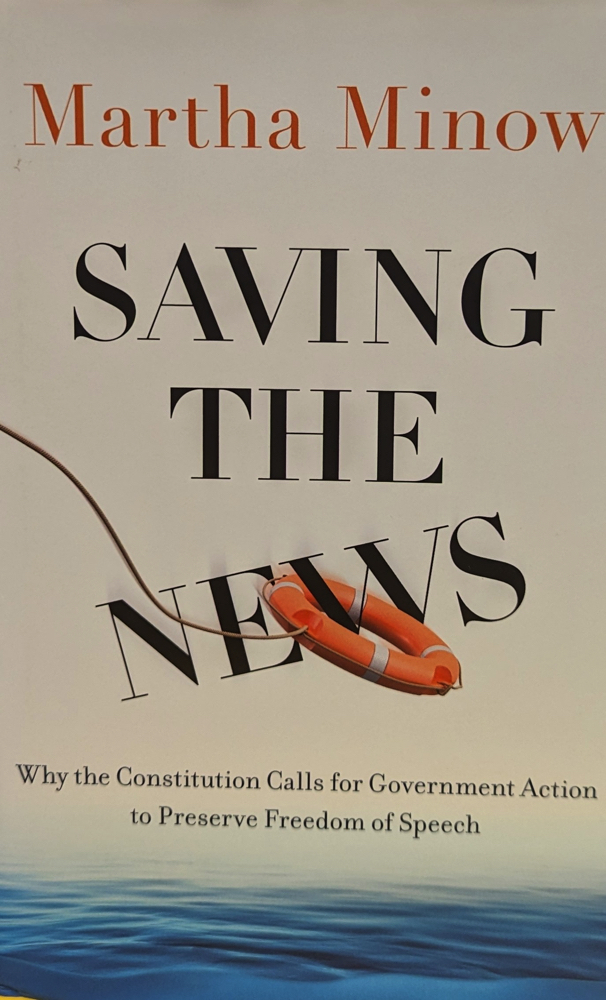How has the rise of the Internet and the decline of traditional publications affected the mainstream news industry–and the nation’s democracy? In her book Saving the News: Why the Constitution Calls for Government Action to Preserve Freedom of Speech (2021), 300th Anniversary University Professor Martha Minow assessed the evolving twenty-first century media landscape. Minow has worked as a journalist, taught courses on constitutional law, privacy, and media since 1981, and served on the boards of multiple public media companies. In this edited and excerpted interview with Harvard Magazine, she discusses her book and developments since it was published, the digital revolution, and her perspective on the government’s duty to uphold and support the free press—an obligation enshrined in the Constitution.
~The Editors
Harvard Magazine: Why is “saving the news” so important?
Martha Minow: The alarming news—and it’s only continued and even escalated—is the loss of journalists who are paid for their work (and of media outlets that are engaged in serious journalism). It’s in the hundreds every week. And local news is most particularly affected in the United States. Another trend is the rise of the digital platforms and the degree to which they allow users to post reports—news that’s been developed elsewhere—and don’t pay for it. When you look at the polls about where people get their news, a majority in the United States and increasing numbers around the world say they get it from a digital platform. Almost none of the digital platforms actually pay for the news. There, once upon a time, was a virtuous circle, so that profits would be plowed back into paying for news, and that’s very much been undermined—couple that with the amplification of misinformation and disinformation through digital tools and platforms. We’ve always had disinformation and misinformation, probably since human beings could speak, but only recently, in the last 10 or so years, have we had the ability for any person to amplify a lie and spread it to the world costlessly to themselves. We have that now, and we have, of course, bots and AI—artificial intelligence—that are generating such things.
HM: The first line of your book’s introduction states that “The United States Constitution specifically mentions only one private enterprise—the press—and does so in the context of according it constitutional protection,” and you later describe the press as “a distinct bulwark for the liberty of the people and their vision of self-government.” How did the Constitution’s Framers so early in our nation’s history recognize the significance of and need for press freedom?

Martha Minow: While there’s not an enormous amount of material about it, it is very clear that the Framers of the U.S. Constitution—and in this case of the First Amendment—were very mindful of the role that the press played in the Revolutionary era. It was the chief way to get [word] out to various communities, including communities in the woods, as well as in villages, [about] the issues that led to the Revolution, and then [to communicate] the organizing tactics of the Revolution and of the construction of a Constitution. Jefferson was pretty clear that, if we had to pick between a free press and some other goods, he would pick the free press in terms of preserving democracy.
HM: You also write that this is a “time when the for-profit basis of newsgathering and sharing is strained, even failing.” Could you talk further about our current media landscape and how it differs from the past?
Martha Minow: Every new technology has disrupted the activities of gathering and sharing news, and that includes the telegraph, that certainly includes radio and television, then cable [TV], and now the Internet. What has really changed is this access for “free,” and I’m going to put that in quotations. Users, of course, are not really getting access for free—they’re giving [away] their data, and the data is a kind of gold mine for the tech companies, which sell information related to the data and sell targeted ads. But the way that advertising became a critical portion of the business model of media in the nineteenth century in the United States—that is totally disrupted if not destroyed, because the advertising has shifted to online, and it shifted to these platforms that, as I say, are not in the business of paying for journalism, and instead swipe the products of other outlets, and don’t pay for it.
HM: What was the hardest part of writing your book?
Martha Minow: Developing lawful constitutional proposals that could work, that could be politically feasible. I became much more immersed in the economics of the industry than I had expected, and that also took me to antitrust law and public utility law, not just in the United States but also globally. Subsequent to publishing the book, there emerged a proposal that I’m interested in, which is middleware. Middleware is just a word to describe the content moderation function of the large platforms. Right now, it’s bundled into those platforms. But there’s a proposal in my mind to set up legal requirements to open up competition over middleware. That way, you and I could each choose who is doing the content moderation for us. That could become a business in which there would be competition for consumers. Maybe you’ll want to select one that actually says, “We have bona fides as journalists”? Or maybe I want to select one that has a particular angle on science. Consumers could actually tailor it and have more control.
Once upon a time in the nineteenth century, for example, when a lot of newspapers existed—many, many more than currently exist (in a metropolitan area, there could be six to 10 newspapers)—many people would subscribe to more than one. But even if they subscribed to only one or only read one, they were picking, and they were picking the viewpoint and the curation. It’s now less obvious who’s doing the curation.
HM: And your belief is that readers should be completely aware of who is curating their content?
Martha Minow: Absolutely, and have some choice over it. Let us see what the pattern is, and let us choose if we want to add serendipity or controversial counter points of view.
HM: Aside from these higher-level protections and regulations, what advice do you have for individual readers navigating this new media landscape? How can they avoid the digital gerrymandering and echo chambers?
Martha Minow: I don’t think they can avoid it, but people can try to be mindful of it and then, among other steps, pay for news. I’m a big fan of doing that. Also, being very mindful and proactive about news feeds, trying to read material that comes from a different point of view than their own favored ones. I think, too, that individuals can demand action, and the action can be local governments, it can be philanthropies, it can be businesses, it can be the federal government. I think it’s urgent. I think this is an emergency. And if more people demanded disclosure, for example, about how the curation is done—if that was a movement—that would affect the media companies. If more people actually called for middleware, that could affect public policy. I also, not surprisingly, do believe that increasing and amplifying the sources of reliable news is another good step.
HM: If this misinformation, disinformation, digital gerrymandering—if they persist for a long, long time, what dangers does this pose to society at large?
Martha Minow: We can just simply look at COVID—the explosion of anti-vaccination websites and misinformation that led to the low levels of uptake of vaccinations in many parts of the country, even though it was available. That in turn has led to the proliferation of more variants of the virus. That’s just an example. It wasn’t the Internet that created misinformation, but it amplifies it.
HM: So it’s even a public health crisis.
Martha Minow: Even a public health crisis. Exactly.
HM: What are some of the greatest obstacles to saving the news? Does it have to do more with resources and funding or just the amount of time these sorts of regulations take?
Martha Minow: The number one obstacle is that it’s not high on the agenda of either politicians or everyday people. There are many other things that are competing for people’s attention right now. You have to have greater demand by readers—by users—for higher quality news and for a better ecosystem. A lot of people are identifying misinformation as a concern or worry about harm to young people from spending time online. Those are just small pieces of this larger puzzle. So, as is often true, when you have a complex issue, it’s harder to get public policy organized around the complexity of the entire digital media ecosystem as opposed to one slice of it. I think another concern is finding the business models that will work. There’s not going to be a silver bullet here. It’s going to be combinations of philanthropic dollars, subscriptions, ads—different ways in which media will be able to support itself.
HM: What do you see as the biggest changes that need to happen? Does it just have to do with regulation and law, or do readers need to take it upon themselves to navigate better? How can we all contribute in our different roles to a better media landscape?
Martha Minow: I think about it in three different buckets. The first is, we need some changes in public policy with regard to the digital platforms. They should be treated as responsible actors. Currently, they are not. There’s a law in the books, section 230 of the Communications Decency Act, that immunizes the tech digital platforms from the same liabilities that attach to the Boston Globe or CBS News simply because when Congress adopted the law, there were no [such] businesses, and they wanted to create some free space for experimentation. Fast forward to the present day, these tech platforms are now the largest capitalized companies in the world. I don’t think they need that kind of insulation from the laws that apply to everybody else, the laws regarding defamation, fraud, consumer protection.
The second bucket is to tackle abuses. Thinking about abuses from economic power, like concentrated power of the tech platforms. Let’s have competition over middleware, let’s have—if not total antitrust activity—let’s at least think about opening up competition. Public utility is another framework I explore in the book, but also abuses that could be tackled under existing law that just aren’t enforced—consumer protection. Every digital platform has a term of service agreement. They’re not enforced. There’s not even disclosure about whether the companies are following what they say they’re doing. There are consumer protection laws in every state in the country. There’s federal consumer protection law. We could enforce them. We could improve them also. We could imagine creating state, local, even national oversight of these consumer protection issues. There could be taxation of the Internet companies, so there could be targeted taxation of any kind of targeted ads, and let’s set aside the resulting revenues to support public alternatives, nonprofit alternatives, and research looking at data about the news industry.
The third bucket is to support and amplify a variety of reliable sources of news. Public media is one, but you could also have something like the Local News Sustainability Act that’s pending in Congress, which would give a tax exemption or tax deduction.
HM: What role do the U.S. Constitution and the First Amendment play in all of these goals? You dive into it in your book, but do you see it as posing a barrier or as a resource?
Martha Minow: I think one of the biggest misunderstandings is that the First Amendment prevents the government from doing anything in this field. That’s just not true. The book examines many cases where the courts have actually been involved in the regulation of the structure of the industry and other kinds of areas. Protecting the media from the government’s censorship I think is critical, but there’s still a lot of the activities we’ve been talking about that are perfectly lawful. If there’s one lesson I hope people take away from my work, it’s that the First Amendment is not a barrier to government action. It’s certainly not a barrier to private action.
But there’s another role that I think that the Constitution plays, and it’s probably the most argumentative aspect of the book, in which I suggest that, while ours is largely a negative rights Constitution—it sets limits on what government can do—there are in some nooks and crannies elements of a more positive Constitution, what government has to do, the obligations it owes to us. In the First Amendment area, there are some language and some court opinions that we have rights as readers to receive information. That’s a positive right the government has to protect. I want to suggest that, if the news industry collapses, that right is obviously destroyed. The Constitution is not a suicide pact, said Justice Frankfurter at one point. And if there are interpretations of the Constitution that prevent actions that would revitalize the news industry, they should be reconsidered because democracy itself is at stake.









